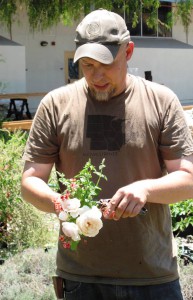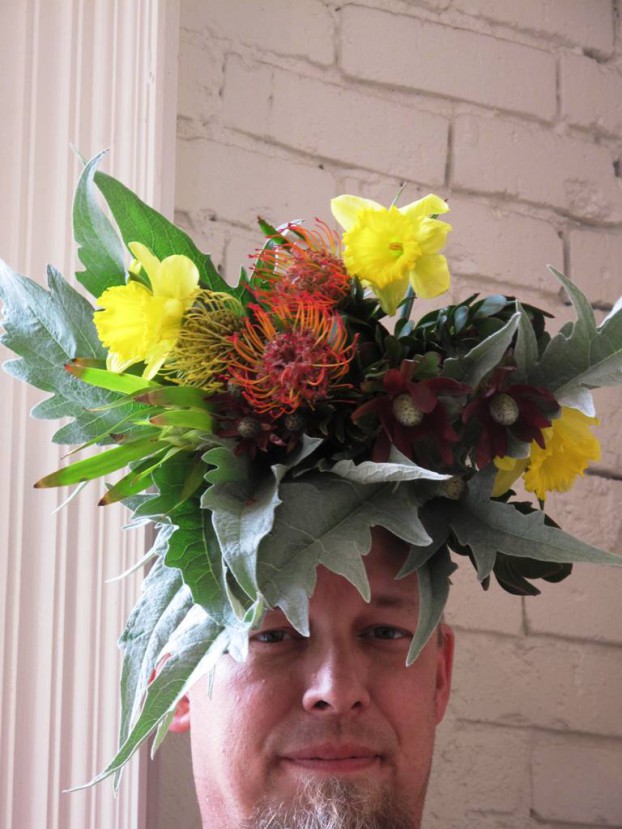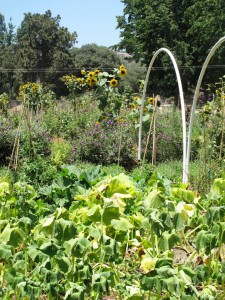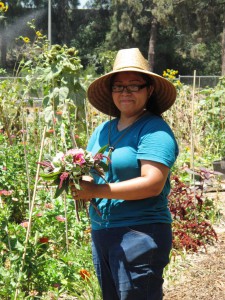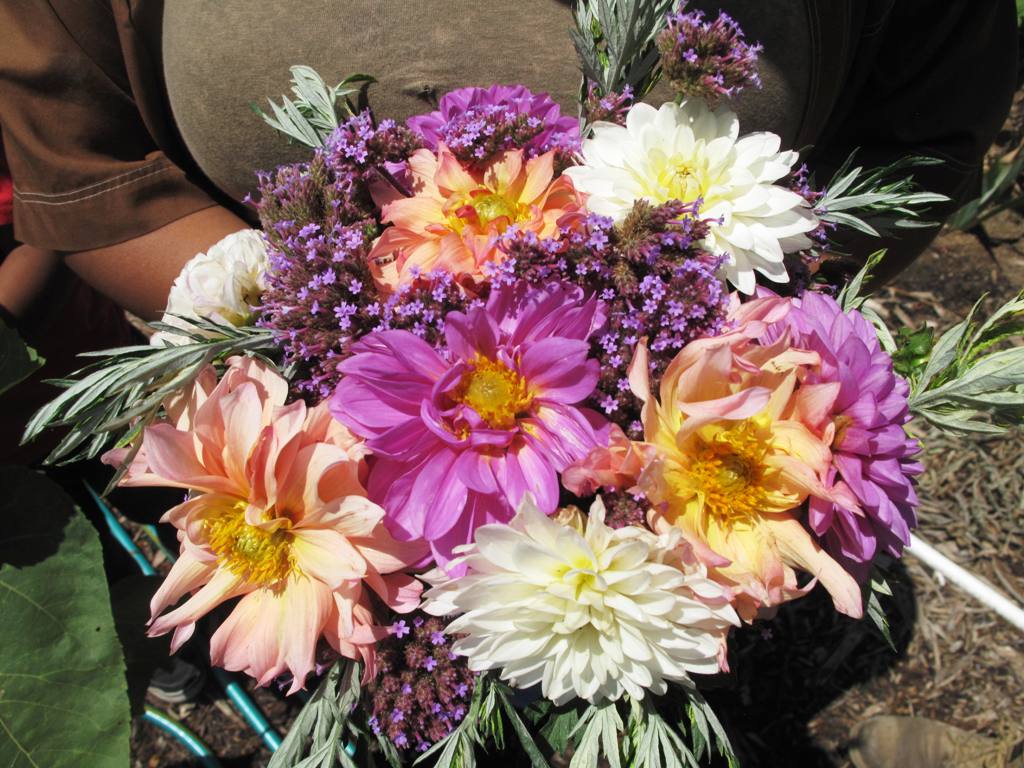Podcast: Play in new window | Download
Subscribe: Apple Podcasts | Podcast Index | RSS | More
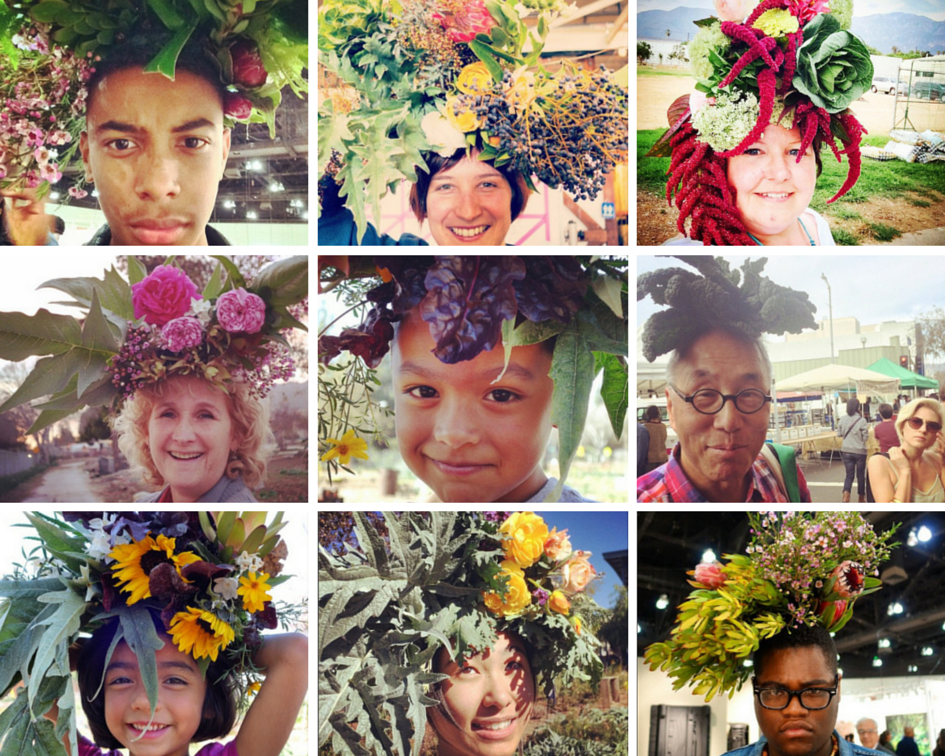
Some of the beautiful faces who’ve allowed Mud Baron to photograph them with flowers on their heads.
This past week took Slow Flowers to Southern California, where I combined business, pleasure, flowers and friends, in a whirlwind five days. I successfully cornered Mud Baron, one who rarely slows down himself, to record today’s interview. I’ve wanted to have Mud on the podcast for more than a year, ever since I visited Muir Ranch, the school garden he manages at John Muir High School in Pasadena.
You may not know him as Mud Baron. Yes, his nickname is Mud! But if you’re a follower of beautiful flower images on Instagram, you may know him by Co-Co-Zoe-Chee, or @cocoxochitl, his alias there, with 4,500 followers and thousands of posts. And many contain the hashtag #flowersonyourhead – one of Mud’s gleefully subversive campaigns to place photos on one’s head and snap a photograph, Frida Kahlo-like, for Instagram and other places.
As we discuss in the interview, I have succumbed to Mud’s flowers on your head shenanigans and also witnessed Mud at work, getting complete strangers to comply with his outrageous (and quite poignant ) requests. Check out his gallery of portraits by searching #flowersonyourhead.
Here’s a bit of what I wrote in August 2013, after a visit to Muir Ranch. I hope it round out this introduction of Mud.
In 2011, a dedicated team of volunteer teachers and students began converting 1.5 acres of Pasadena, California’s John Muir High School campus into a school-based farm.
Today, Muir Ranch grows a variety of flowers, vegetables and fruits that are included in weekly CSA boxes as well as school cafeteria lunches. Students can complete community service or internship graduation requirements by enrolling in classes at the Ranch. Muir Ranch also provides paid internships to students, which are funded by private donations, special events, farmer’s market sales, and subscriptions to the produce box program (CSA).
Every week, Muir Ranch CSA subscribers get a box or bag of about 7-10 different types of fruit and vegetables grown without the use of pesticides or chemical fertilizers. Customers pick their shares up at central distribution sites throughout Pasadena. Muir Ranch CSA partners with several local farms for seasonal fruit and vegetables to supplement what they can produce, providing tax-deductible weekly boxes to over 100 subscribers. It is the CSA program that generates much of the income that keeps this place operating.
Mud Baron, a passionate school garden advocate who serves as the Executive Director of Muir Ranch, is one of the people at the hub of this endeavor. That sounds like a high-falutin’ title, but in all reality, he is true to his nickname. Mud gets down and dirty – and REAL – with his kids, teenagers whose horizons are much brighter after they’ve learned to grow and sell food and flowers to local customers.
How did this former design-build contractor end up teaching gardening and farming skills to urban youth? I’m still trying to figure out the exact path of Mud’s career, but suffice it to say he’s in his element growing food and flowers.
Many programs besides the CSA are supported under the umbrella of Muir Ranch, such as partnerships CSAs run by with other local schools and learning gardens. Muir Ranch also and hosts monthly “Plug Mobs” to help other groups in the community plant their own gardens.
In Mud’s mind, no Southern California-based teacher should go wanting for school garden supplies. “The Plug Mob program means that finding seeds and plants is no longer a factor for 2,000 schools,” he says. Muir Ranch operates like a plant nursery, helping source and distribute seeds, bulbs and flats of plant starts. Like modern-day Johnny Appleseeds, Mud and his supporters share what they have and spread around the love.
As more young people “connect the dots,” they become involved in how food is grown, distributed, and finally cooked into healthy meals. Besides being a center for education, Muir Ranch hosts a variety of ongoing and special events. The program is known for its floral arrangements, and I love that Mud has taught his interns and student workers how to harvest and assemble bouquets.
Word is getting out about Muir Ranch’s flowers. One of Mud’s interns just earned $400 selling wedding flowers to a market customer. According to Mud, that experience opened her eyes to possibilities for a bright future.
Things are ever-changing at this school garden, with new crops of kids getting involved and older ones graduating and enrolling in college. And Mud continues his radical outreach on behalf of school gardening, food justice and the importance of flowers in our lives.
I promise you our conversation is all over the place, bouncing between sentimental and serious to hilariously irreverent, a lot like Mud himself.
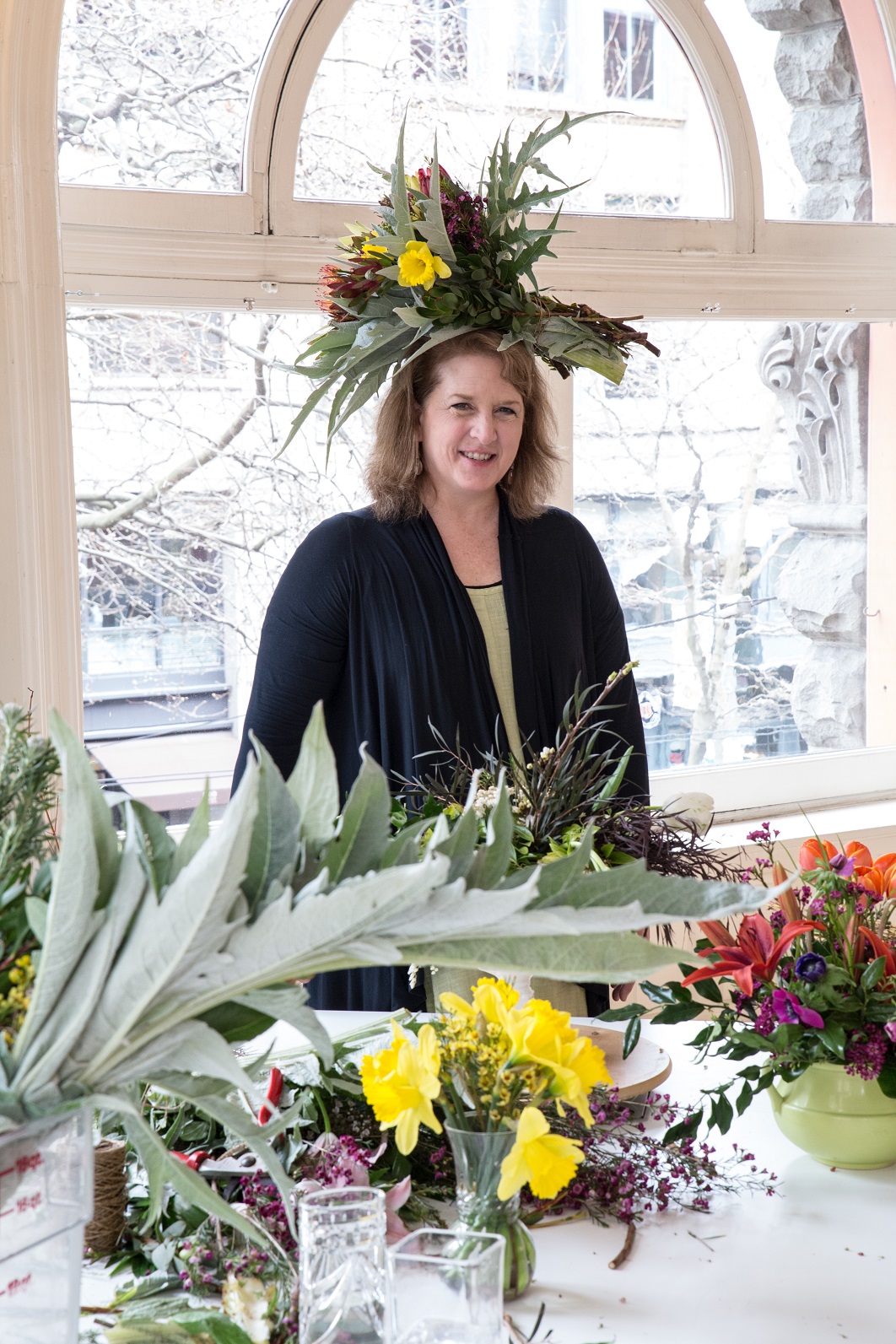
My photographer friend Jean Zaputil, of Studio Z Photography and Design, took this portrait of me after Mud plunked a huge bunch of flowers on my head, March 2014.
I will devote the next two weeks to Valentine’s Day, turning the focus to American grown flowers for this top floral holiday. If we can’t show our love with local flowers, what’s the point?
I’ll introduce you to some of the people who are doing exciting things to innovate at Valentine’s Day, getting their clients out of the gift-giving rut that involves thinking a generic bunch of a dozen red roses equates true affection and gestures of love. Please return to gain new ideas – and let me know what you’re doing this Valentine’s Day – I’d love to share your own efforts with our listeners.
Thanks to the Slow Flowers Tribe, this podcast has been downloaded more than 32,000 times. In fact, the month of January hit an all-time high as our most popular month to date, with more than 3,000 downloads of current and archived interviews – and I’m encouraged to know that more listeners are discovering this flower-powered podcast every day.
If you like what you hear, please consider logging onto Itunes and posting a listener review.
Until next week please join me in putting more American grown flowers on the table, one vase at a time.
The Slow Flowers podcast is engineered and edited by Andrew Wheatley and Hannah Holtgeerts.









